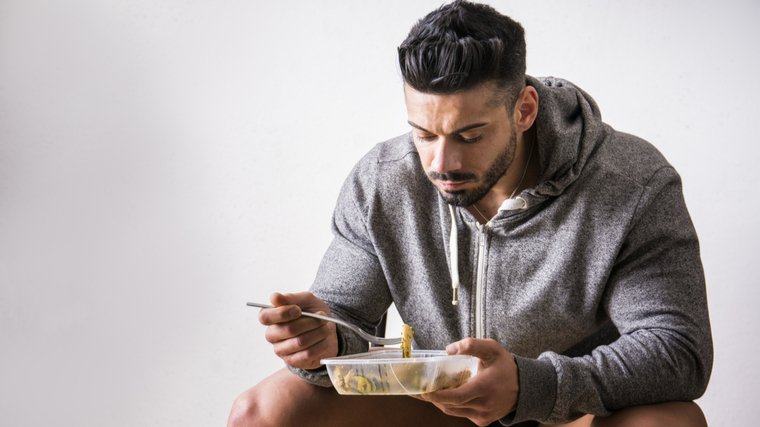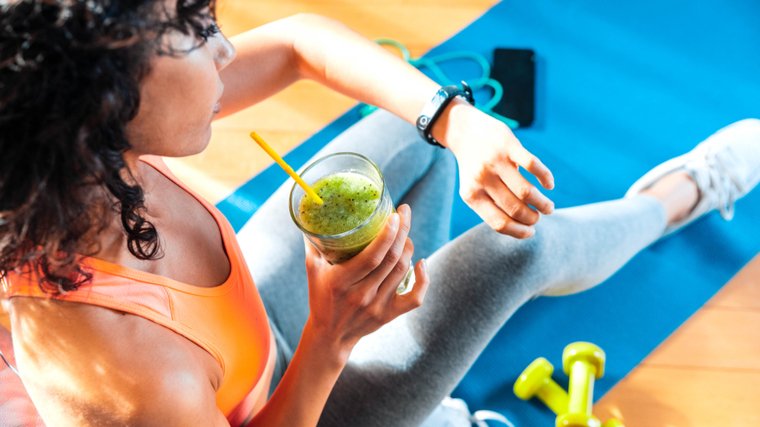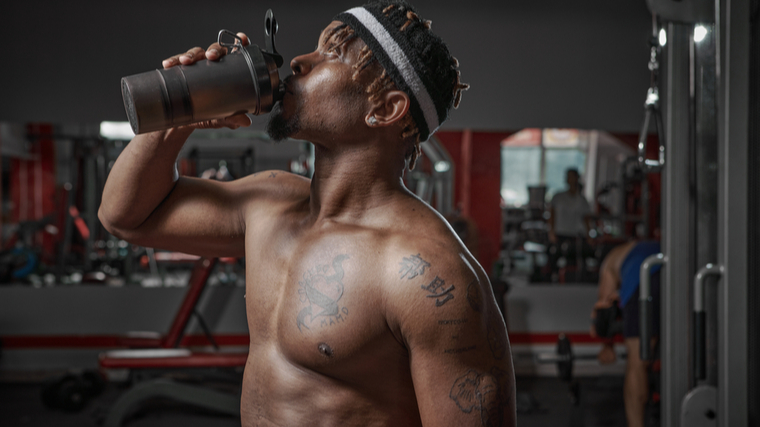Can You Eat Intuitively as a Bodybuilder?
When people think of nutrition for bodybuilders, they often imagine cardboard-tasting protein shakes, calorie counting, and a whole lot of plain chicken and rice. But restricting what you eat (and when) doesn’t have to be the whole story. Especially when in the offseason, being more flexible in their eating habits may be helpful. Bodybuilders looking to approach their sport sustainably might find a lot of value in the principles of intuitive eating.
Intuitive eating involves relying on your internal hunger and satiety cues (i.e., feeling full) to determine what and when you eat. Bodybuilders are already used to listening to their bodies about when to pull back and when to push it harder in the gym. Intuitive eating can serve as a natural extension of that attention to your body. It’s been shown to help physique athletes develop more confidence in their bodies and improve their overall mental health. (1)(2)(3)(4)

But a bodybuilder can be as confident as they please and still lose their competitions if they’re not deemed to be up to snuff physique-wise. Low levels of body fat is an essential part of a bodybuilding competition, and intuitive eating by nature just doesn’t emphasize weight loss. BarBend chatted over email with Registered Dietitian Nutritionist and Sports Performance Dietitian Gianna Masi to get her insights on when and if bodybuilders can incorporate intuitive eating into their programming. So can bodybuilders use intuitive eating principles to succeed in their sport? Read on to find out.
Editor’s note: The content on BarBend is meant to be informative in nature, but it should not be taken as medical advice. The opinions and articles on this site are not intended for use as diagnosis, prevention, and/or treatment of health problems. It’s always a good idea to talk to your doctor before beginning a new fitness, nutritional, and/or supplement routine. None of these supplements are meant to treat or cure any disease. If you feel you may be deficient in a particular nutrient or nutrients, please seek out a medical professional.
What is Intuitive Eating?
Intuitive eating is a non-restrictive approach to food that is governed by your sense of being hungry or full. You’ll tune into your internal hunger and satiety (fullness) cues to determine what you eat and when. A common example of eating intuitively is listening to your body when you feel hungry, and eating. At that level, this nutritional approach is fairly straightforward.
Food isn’t just about fuel, and intuitive eating principles take that into account. You might be eating to power your next workout, or you might have been looking forward to the taste of birthday cake at your friend’s birthday party all week. Intuitive eating helps you think about your relationship with food beyond a "good" or "bad" lens.
View this post on Instagram
A post shared by Gianna Masi, RDN, CISSN, CPT (@gianna.masi)
[Related: Navigating Bodybuilding and Muscle Dysmorphia]
Intuitive eating helps you check in with yourself about why you’re eating (or not eating) a particular food. For example, when you’re heading aimlessly toward the snack cabinet — are you hungry or are you bored? When you’re declining that second slice of pizza, is it because you’re full or because you think you should say no? This approach teaches that food is value-neutral — no food is inherently better or worse than others. It just serves different purposes at different times.
Common Misconceptions About Intuitive Eating
Figuring out what intuitive eating is not is just as important as figuring out what it is. Two big misconceptions about intuitive eating follow.
Misconception — Intuitive Eating is a Tool for Weight Loss
Intuitive eating isn’t a diet plan to help lose weight or change your body composition. Instead, Masi explains that it’s about challenging belief systems about the value of food.
Rather than a way to alter your body composition, intuitive eating is about listening to your body’s cues about when you’re hungry or full. "It is not a way to diet down to your leanest weight," Masi says. As such, you can lose, maintain, or gain weight while approaching food in this way.
Misconception — Intuitive Eating Means Eating Sweet All the Time
According to Masi, a lot of people think that intuitive eating is all about eating all the sugar, all the time. "I often see people think intuitive eating is easy and you ‘just eat whatever you want’ like cookies and cake," says Masi.
But that’s simply not how it works.
Instead, intuitive eating involves listening to your fullness, hunger, and — yes — your desires. Those desires might be for chocolate cake, or they might be prepping for your next competition — or both at the same time. "It’s honoring your body’s hunger and fullness with a variety of food preferences for nourishment, function, and enjoyment," Masi explains.
Can Competitive Bodybuilders Use Intuitive Eating?
As a bodybuilder, you listen to your intuition every day that you train. Are your muscles approaching failure or can you push a little harder for another rep or two? Physique athletes by nature pay a lot of attention to their bodies. It takes a lot of vigilant observation of your own body to build bodybuilder’s physique. What and when you eat is one crucial form of that intensive attention to your body. In that way, intuitive eating seems like a natural thing for bodybuilders.
Is it possible for a bodybuilder to be more attuned to themselves? Absolutely.
Masi goes on to explain that sometimes, bodybuilding is just about ignoring when you’re hungry — or, in the case of bulking, ignoring when you’re full. "In the sport of bodybuilding," Masi says, "the most successful athletes often have to ignore their body’s hunger cues."
If you’re going to be on a pro stage, there’s just no way around it — you’ve got to count your calories and restrict what you’re eating around your competitions. But that doesn’t mean there’s no place for the principles of intuitive eating in a bodybuilder’s training cycle. There are strategies that bodybuilders can learn from intuitive eating that can help their cuts become more sustainable and ultimately, perhaps help them last longer — and stay healthier — in their sport.
Still hungry after you’ve hit your calorie target for the day? You’ll likely be ignoring your body’s hunger pangs. And if you’re full but still need to pack in more food for your muscle-building phase, you’re also listening to your numbers instead of your fullness factor.
Intuitive Eating Strategies for Bodybuilders
Intuitive eating is largely about weight neutrality — bodybuilding is very much not that. Instead, competitive bodybuilders focus on extremes of muscle size and minimal body fat. As such, intuitive eating as a whole largely won’t get you where you want to go as a competitive bodybuilder — especially in competition season.
Focus on Intuitive Eating During Your Offseason
Your offseason is the perfect time to use the principles of intuitive eating. It might be difficult to avoid restriction during cutting phases right before competition — but during the offseason, you can afford to be more flexible. When your focus is on continuing to improve muscle size and strength during the offseason, you can fuel your body in a more comfortable way. "If you’re in an off-season, you could explore how it would feel to not track or weigh your food if that’s what you’re accustomed to," Masi suggests.
Tuning back into your body, and slowing everything down can be really valuable.
Eating when you feel hungry can help you stay more satiated and make you less likely to binge eat. (5)(4) In doing so, your offseason gains might actually become more sustainable and set you up for more success during competition season.
Customize Your Deficit Strategies
If you are in a period of caloric deficit, you can use the principle of intuitive eating — listening to your body’s cues — to help inform how you achieve your deficit. Intermittent fasting might work very well for your buddies during a cut, but if you can’t sleep at night or are irritable because you’re so hungry, you might want to try a different approach for yourself.

Maybe your workouts are less efficient when you don’t time your carb intake just right for your own body. Use trial and error to adjust accordingly instead of powering through because a different kind of carb cycling works for someone else.
If it Fits Your Macros
The nutritional strategy of IIFYM (if it fits your macros) isn’t exactly intuitive eating, but it is a cousin of intuitive eating principles. IIFYM is an approach to nutrition that says that no food is off the table — as long as it fits in with your macronutrient requirements.
Bodybuilders using an IIFYM approach often have better micronutrient profiles than athletes with restrictive diets that may tend to separate foods into "good" and "bad." (6) Approaching eating this way might slow your weight loss goals, but if you schedule out your programming strategically, that can work for you.
Masi says that this kind of thinking can be helpful for many bodybuilders. "In the culture of bodybuilding where the old-school mentality was to eat this many ounces of chicken and broccoli, I’m happy to see more and more athletes include a variety of foods that fit their preferences and style of eating now."
Even during competition season, research shows that slower weight loss rates are more sustainable physically and psychologically for bodybuilders than rapid weight loss. (7) Losing body fat slower also reduces the risk of losing muscle during a cut. (8) So, even though intuitive eating’s IIFYM cousin might be slower about weight loss, it can still be good for your gains.
Less Frequent Physique Checks
This one might be hard to swallow for bodybuilders who love nothing more than posing to try and compare their progress from one day to the next. But research suggests that instead of checking your physique on a day-to-day basis, scheduled and coach- and health professional-supervised physique checks and weekly weigh-ins are more sustainable for physique athletes. (4)

Less frequent physique checks can make it a lot easier to tolerate the slower rates of weight loss that come with a non-restrictive approach to food. (4) Even though physique checks don’t strictly fit the profile of "nutrition," less frequent checks do align better with intuitive eating principles. Since intuitive eating will have you focus more on your body’s cues than what your body looks, weighing in less often may help bodybuilders get more comfortable with eating intuitively.
Benefits of Intuitive Eating Strategies for Bodybuilders
On the one hand, intuitive eating makes sense for bodybuilders who spend their entire gym time paying attention to and heeding their bodies’ cues. On the other hand, it might not seem so intuitive in the sense that bodybuilders require very low levels of body fat to be competitive in their sport. Here are some benefits to integrating intuitive eating strategies even while you’re an active physique athlete.
Minimized Risks of Eating Disorders
Retired athletes have successfully used intuitive eating to help recalibrate their relationship with food after years of restriction and regulation due to their sport. (9) Intuitive eating has also alleviated retired athletes’ disordered eating practices and given them self-reported feelings of liberation about food and their bodies. (9)
Physique athletes who use intuitive eating strategies widely report lower levels of internalized shame about how their bodies look. (1) Research also shows that intuitive eating in bodybuilders is associated with better overall mental health and dramatically reduced risk of experiencing disordered eating. (2)(3)(4)
"Poor coaching and adhering to rules that aren’t rooted in evidence is where many beginners (and even advanced athletes) fall victim to the food-rule-following that can lead to disordered behaviors," Masi says. But that doesn’t have to be the case.
Sohee Lee prepped for a bikin competition while eating a Snickers bar every day.
Masi explains that Lee is just one example of how understanding your own energy balance — rather than choosing foods based on whether they’re "good or bad" — can help you customize your competition prep.
View this post on Instagram
A post shared by Sohee Lee Carpenter, MS, CSCS*D (@soheefit)
[Related: Check Out Robert Oberst’s New Strongman Diet]
More Sustainable Fat Loss
Just because intuitive eating might not be able to yield the rapid weight loss that bodybuilders may require before a competition doesn’t mean it’s not helpful at all for fat loss. For athletes who train regularly, flexible eating habits help lose as much body fat as rigid eating habits during a 10-week weight loss cycle. (10)
Intuitive eating has also been shown to be more effective at weight loss and control long-term than restriction-based dieting. (11) If you’re concerned that intuitive eating just won’t cut it during competition season, let its principles shape your offseason nutrition to keep your body better regulated long-term.
Adaptable to Training
Bodybuilders are already accustomed to listening to the cues of their body. In the gym, bodybuilders use a wide variety of strategies to get themselves closer to full muscle failure. Whether it’s developing your mind-muscle connection or paying attention to your muscles to see whether your brain wants to stop or your muscles are actually done, bodybuilders are used to their bodies’ cues.
In that way, intuitive eating might actually be very
Deja una respuesta

►Te puede interesar...